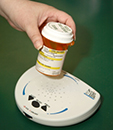Department of Managed Health Care
Communication Access - Vision Disabilities Fact Sheet
If You Are Blind or Have Low Vision
Make sure you have communication access
What is communication access?
It means getting information in ways that you can understand and use. For example:
- You can get print information in different ways, like large print, Braille, or as an electronic or audio file.
- You can get more time to communicate with your doctor.
Who needs this access?
You might need it if you have trouble seeing and reading. You might also need it if you are helping someone get health care – such as your child, another family member, or a friend.
Why does access matter?
It is important to understand your health care. For example, you need to know how to take your pills correctly. You might need this information in large print, Braille, or audio.
What if I ask for access but can’t get it?
You can file a complaint with your health plan. The phone number is on your membership card. Or call the Help Center at 1-888-466-2219.
Do I have a right to communication access?
Yes, if you have a disability. The federal Americans with Disabilities Act along with other California laws protect your rights. You also have the right to get written information in ways you can use.
Drug labels.
People often use their medicines incorrectly. It’s important to get labels you can read. You can ask for labels and drug information in large print or Braille. Some large pharmacy chains now offer talking labels.

Do I pay for communication access?
No. There is no cost to you.
I can read the information, but I can't always understand it.
You have a right to understand your care. Keep asking questions until you are sure you understand. Repeat the information in your own words. You can ask for a longer appointment if you need more time.
Examples of written information for which you might need communication access:
Ask for these and other information in large print, Braille, or another format:
Information from your health plan
- Your benefits and costs
- Lists of health care providers
- Forms to use if you have a problem
Information from your pharmacy
- Prescription labels
- How to take your medicines
- Safety information about your medicines
Information from your doctors
- Preparing for a test or surgery
- Follow-up care
- Information about your health
- Appointment reminders
- Forms to sign
Other ways to get written information
In addition to large print or Braille, here are other ways to get information:
Audio: Computer, smart phone, or tablet.
If the information is e-mailed to you, you may be able to read or listen to it on your device. You can make the print big on your device. Some devices have programs that can read the information aloud to you.
Someone can read the information to you.
Your doctor may be able to record it on your smart phone, voice mail, or other recording device. Then you can listen to it whenever you need to.
What access do I need?
Each person has different needs. Review the checklist below. Mark down what your access needs are and consider if there are any needs you might have that are not listed that you want to add. Then, ask your health plan, doctors, and pharmacy to keep a copy of this list of requested reasonable accommodations in your medical records. Before your appointment, you can also talk to the doctor’s office about the things you checked.
Access Checklist
Check the things you need in the list below. Tell your health plan, doctors, and pharmacy about the things you need. Ask them to keep this information in your file.
- I need written information in Braille.
- I need written information in large print.
- I need written information read to me.
- I need information recorded on my smart phone.
- I need extra time for my appointments.
- I need to get appointment reminders in a voice message.
- I need Braille signs or assistance to find your office.
- I will bring my service animal with me.
Other needs:
- _______________________________
- _______________________________